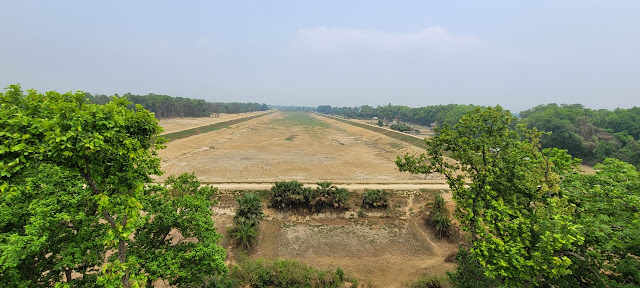Luxury resort for high-value crops: Polynet house empowers entrepreneurial agriculture to thrive

Agriculture is rarely rewarding when unpredictable weather, pests and diseases often make farming a gamble. But agricultural entrepreneur Shafiqul Islam of Rajshahi’s Bagha upazila defied the odds thanks to a modern farming technology: Polynet house.
Leveraging a government project for promoting polynet houses, Islam decided to cultivate mainly capsicum in July last year. He was paid off handsomely as his premium crop found a ready market among foreigners in the region and high-end restaurants. In just the last two months of this year, he earned triple his investment while his harvest will continue till April fetching more.

“Polynet house has made all the differences, my harvests exceeded all expectations,” says Shafiqul Islam. “Without its protection, growing high-quality capsicum would be almost impossible. I required less pest control and irrigation initiatives.”
Islam is one of a total of 81 agricultural entrepreneurs across eight districts of the Rajshahi division who benefitted from producing high-value crops in polynet houses, said SM Aminuzzaman, deputy project director (DPD) of the Department of Agricultural Extension (DAE) project for promoting polynet houses.
Besides Rajshahi, the project is expanded to Sylhet, Mymenshing and Khulna divisions beginning in 2020-21.

The polynet house is an agricultural house covered with high-quality poly paper to control the sun's harmful rays, draught, and extreme cold, the DPD says.
It has sophisticated irrigation management to cultivate high-value crops like capsicum, cucumber, dragon fruit, strawberry, and vegetable saplings. It ensures 20 percent more yields and provides safe crops preventing more than 70 percent of harmful insects.

The DAE spends Tk 27 lakh for installing a polynet house on a piece of 25 decimal lands of an entrepreneur under the project.
After installation, Shafiqul Islam invested Tk one lakh for cultivating capsicum and other crops. He started earning in the seventh month.

“I will fetch more than Tk 5 lakh at the end of harvest,” he said adding that he found a market in the neighbouring Pabna district’s Ishwardi where many Russians live.
Bogura’s entrepreneur Hasan Ali profited Tk 7.5 lakh producing strawberry saplings. Bagha’s Ashraful Islam earned Tk 3 lakh from rock melon, capsicum and brinjal.

In last winter, Rajshahi’s entrepreneur MR Hasan Zuberi presented a stunning display of Chrysanthemum (Chandramallika) flowers on 12,000 plants at his Dreamers’ Garden.
“Chrysanthemum blooms for 20 days in November. But the polynet house enabled me to have flowering from December to the end of February drawing more visitors to my garden,” he said.

Installing a polynet house may seem daunting for farmers for its high cost, but the returns far outweigh the costs, said the DPD Aminuzzaman.
“The project provides polynet houses constructed with sturdy steel frames lasting at least seven years. The farmers have more cost-effective options in using bamboo frames and low-cost poly papers,” he said.

During a recent visit, this correspondent saw that the entrepreneur Shafiqul Islam didn’t leave an inch of his land inside his polynet house in Pakuria village. Besides capsicum, he has grown cherry tomatoes, cucumbers, green chilis, and rock melons.
"It's incredible how well the polynet house supports such a variety of plants,” says Islam. “Witnessing me, some farmers of my village expressed interest in setting up their own. Some exporters reached me too.”
End


Comments
Post a Comment